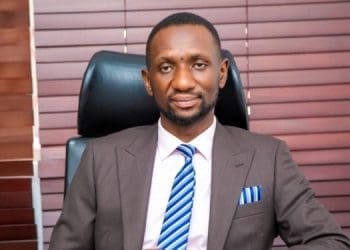Attorney-General has formally discontinued the high-profile criminal case against the founder of defunct uniBank, Dr. Kwabena Duffuor, and seven other accused persons.
The decision, made public on Tuesday, July 22, 2025, through a nolle prosequi filed in court, follows what the Attorney-General’s Office describes as “prolonged negotiations and engagements” that led to the recovery of over 60% of the GH¢5.7 billion allegedly lost in the collapse of the indigenous bank.
The discontinuation of the case, titled The Republic v. Kwabena Duffuor & 7 Others (CR/0248/2020), marks a turning point in the State’s approach to dealing with complex financial crimes arising from the 2018 financial sector clean-up.
The move does not exonerate the accused, the Attorney-General emphasised, but reflects a strategic balancing of cost, benefit, and national interest.
Attorney-General confirms recovery threshold met
In a statement signed by Deputy Attorney-General Dr. Justice Srem-Sai, the Ministry of Justice explained that the decision to end the prosecution was anchored on a benchmark policy developed for financial sector cases.
The policy set a 60% recovery threshold for funds allegedly lost to the State as a condition for reconsidering the continuation of criminal proceedings.
According to the Deputy Attorney-General, the accused persons—led by former Bank of Ghana Governor Dr. Duffuor and including his son, Kwabena Duffuor II—engaged the State in extended negotiations and agreed to a settlement that returned over 60% of the disputed amount to public coffers.
This, the Ministry said, justified the exercise of prosecutorial discretion in favour of discontinuance.
“The nolle prosequi is not a declaration of innocence,” the statement clarified.
“It is a recognition that the State’s core objective in this case—recovery of substantial public funds—has been achieved to a satisfactory degree.”
One of Ghana’s most prominent financial crime cases
The charges against Dr. Duffuor, a former Finance Minister and the seven others stemmed from the collapse of uniBank Ghana Limited in August 2018, when the Bank of Ghana revoked its licence as part of sweeping reforms aimed at sanitising the financial sector.
The central bank declared the bank insolvent, citing unlawful related-party transactions, a staggering capital deficit, and unsafe practices that put depositors’ funds at risk.
The State alleged that over GH¢5.7 billion had been siphoned from the bank through insider dealings, leading to criminal charges that included willfully causing financial loss to the State, dishonest appropriation of public funds, and money laundering.
The prosecution, which began in 2020, was one of the flagship cases emerging from the government’s broader financial sector clean-up programme.
That initiative affected more than 400 financial institutions—banks, microfinance firms, and savings and loans companies—and is estimated to have cost the State over GH¢25 billion in bailouts and repayments to depositors.
Strategic use of prosecutorial discretion
The Attorney-General’s decision is being framed not as an abandonment of accountability, but as a recalibration of the State’s objectives in complex economic crimes.
By recovering a significant portion of the allegedly misappropriated funds, the Ministry believes it has struck a balance between securing justice and avoiding the substantial financial and administrative burdens of a protracted trial.
“This decision represents a pragmatic approach to prosecution management,” the Deputy Attorney-General stated.
“Where recoveries are substantial, and continuing litigation presents diminishing returns for the State, discontinuation may serve the broader national interest.”
Legal analysts suggest this marks an evolution in Ghana’s prosecutorial framework, especially in high-value economic cases where negotiated settlements may yield more tangible benefits to the public purse than extended litigation.
Public interest, not vindication
In making the announcement, the Ministry was careful to underline that the decision does not absolve the accused of wrongdoing.
Rather, it is an acknowledgement that in this case, legal pragmatism outweighed the need for punitive judgment.
“The exercise of nolle prosequi should not be misinterpreted as a vindication,” the statement noted.
“It is a tool of prosecutorial discretion, used here in the public interest, to secure a measurable gain for the State.”
This sentiment was echoed in government circles, with legal experts noting that such decisions are consistent with international practices in handling complex financial disputes—particularly where financial recovery can be achieved without prolonged trials.
Maintaining the rule of law
Despite its decision to halt prosecution, the Attorney-General’s Office reaffirmed its commitment to upholding the rule of law and ensuring justice is served in all matters of national concern.
The Ministry insisted that the case had not been dropped lightly, and that similar cases would be reviewed on an individual basis, taking into account the specifics of each circumstance and the wider national interest.
“Each prosecution must balance the twin imperatives of accountability and practicality,” the Attorney-General’s statement concluded.
“In this matter, the scales tilted toward a resolution that secures public funds and spares the State further financial and judicial strain.”
Implications for future financial crime cases
The discontinuation of the prosecution may set a precedent for other cases arising from the financial sector reforms.
Several former executives of defunct banks and financial institutions are still before the courts, and the State’s emphasis on negotiated recovery may influence how those cases are handled in the future.
Dr. Duffuor, who has consistently denied the allegations, remains a prominent figure in Ghana’s economic and political landscape. He is a respected economist, a former Finance Minister, and was a candidate in the 2023 presidential primaries of the National Democratic Congress, the current government in power.
While the conclusion of the case offers some closure for him and the other accused, it also raises important questions about justice, deterrence, and the strategic priorities of Ghana’s legal system when faced with large-scale economic infractions.













